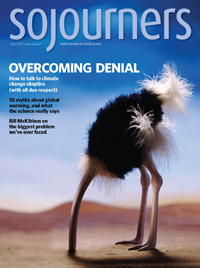Skeptical Science in other media
Posted on 6 April 2011 by John Cook
 The April edition of Sojourners, a Christian magazine on social justice and peace, focuses on climate change. The cover story How to Talk to Climate Change Skeptics features Skeptical Science's 10 most used skeptic arguments and features a familiar looking cover design (slide your eyes over to the right margin of our website to see what I mean). There's a short interview with me on how my faith motivates my climate work, why people deny climate change and unexpected allies. There are also some other great articles including the basics of climate change by Bill McKibben and Addressing the Naysayers by climate scientist Katharine Hayhoe (one of my personal heroes). I particularly appreciated Katharine's closing words:
The April edition of Sojourners, a Christian magazine on social justice and peace, focuses on climate change. The cover story How to Talk to Climate Change Skeptics features Skeptical Science's 10 most used skeptic arguments and features a familiar looking cover design (slide your eyes over to the right margin of our website to see what I mean). There's a short interview with me on how my faith motivates my climate work, why people deny climate change and unexpected allies. There are also some other great articles including the basics of climate change by Bill McKibben and Addressing the Naysayers by climate scientist Katharine Hayhoe (one of my personal heroes). I particularly appreciated Katharine's closing words:
The gospel tells us we are forgiven and free. The gospel motivates us from the heart to love others. The bottom line is that real people in real places around planet Earth are already being affected by our changing climate. Doing something about climate change is making the love of Jesus tangible to hurting people. Our God has made us into people who are designed to look outside of ourselves and love our global neighbor -- and today, that means caring about what climate change is doing to our world.
I also learned this week via @mareebiketouroz that the SkS iPhone app was named a Top 10 Transformative Apps of 2011 Q1. Their review of the SkS app makes for good reading (the main fault being they failed to mention the heroic efforts of Shine Technologies who developed the app pro bono). Positive features include "Comprehensive and updated scientific information that answers many of the climate skeptics claims" while on the negative side, the app "does not show how bad most media is dealing with the issue. The problem would not exist if it was not for mainstream medias dependence on PR material to write stories". Well, we are working on that. Maybe it'll appear in the iPad version! :-)
 Lastly, I should remind everyone that voting for the George Mason University's 'Climate Change Communicator of the Year' award. ends soon (April 15 to be precise). Skeptical Science is nominated for the Organisational Category, which means all the SkS community who contribute here are included in the nomination. There are also a slew of heroes nominated in the individual category, making it a difficult choice. Be sure to vote before April 15!
Lastly, I should remind everyone that voting for the George Mason University's 'Climate Change Communicator of the Year' award. ends soon (April 15 to be precise). Skeptical Science is nominated for the Organisational Category, which means all the SkS community who contribute here are included in the nomination. There are also a slew of heroes nominated in the individual category, making it a difficult choice. Be sure to vote before April 15!































 Arguments
Arguments























 0
0  0
0






Comments